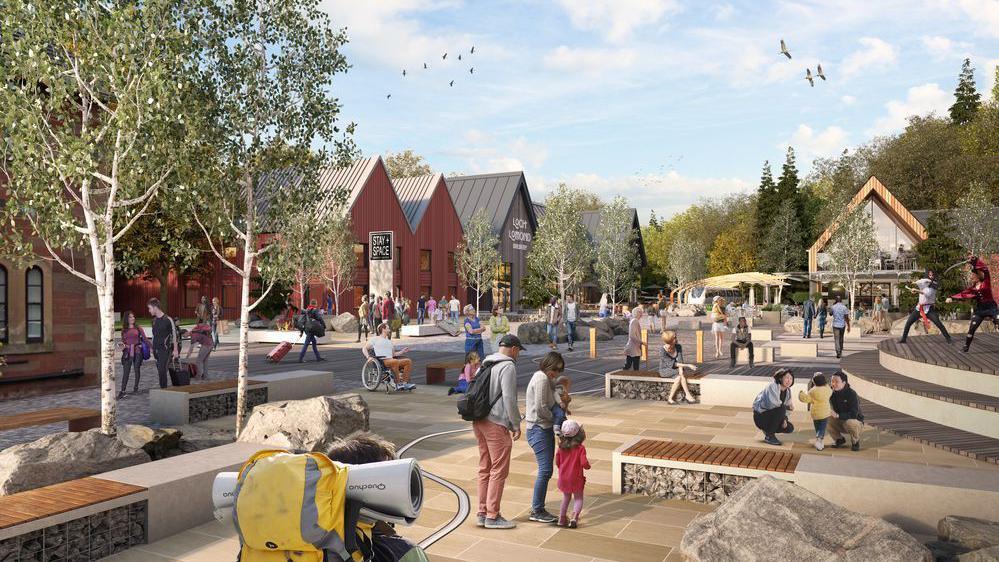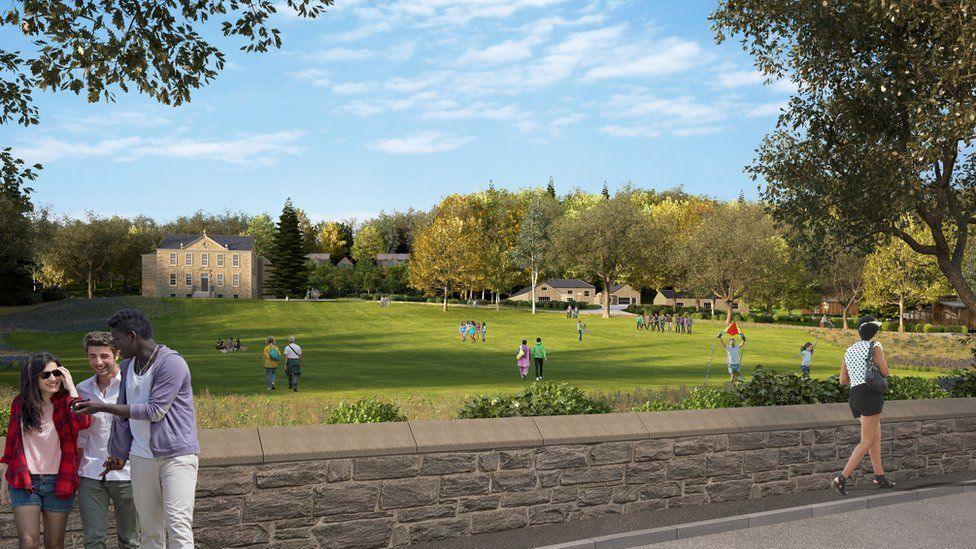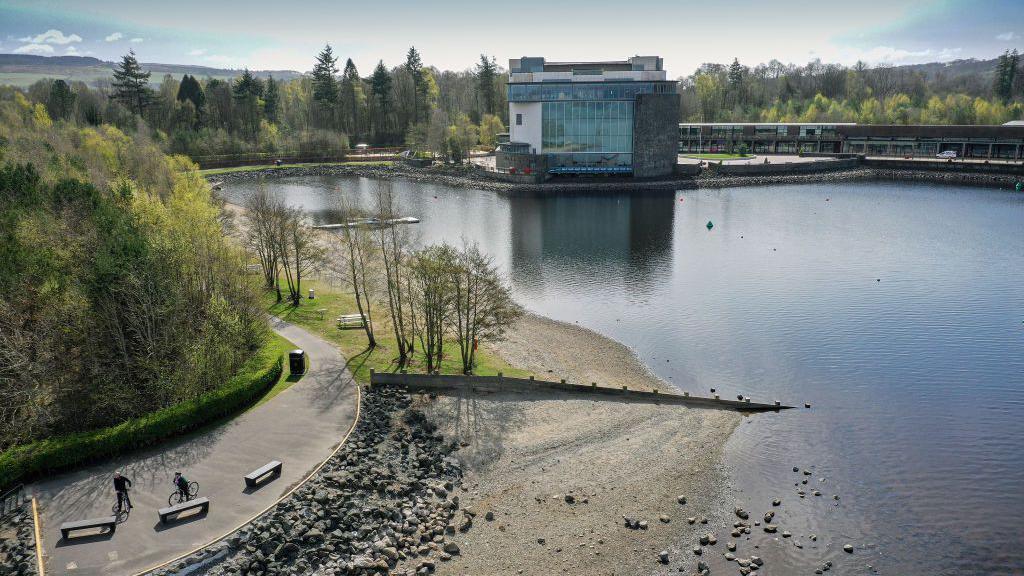What is happening with Flamingo Land at Loch Lomond?

Flamingo Land have been seeking to build a holiday resort since 2018
- Published
A proposed resort on the shores of Loch Lomond featuring a waterpark and monorail is set to be approved by the Scottish government, overturning the decision of the national park authority.
The project was initially rejected last year by Loch Lomond and the Trossachs National Park authority, who said it did not comply with environmental and nature conservation policies.
The proposal is by theme park operator Flamingo Land.
It hopes to build the £40m Lomond Banks resort, which features a monorail, waterpark, hotel and restaurants.
What is Flamingo Land?

The plans feature a waterpark, monorail, hotel and restaurants
Flamingo Land is a theme park and zoo in Yorkshire that has operated since the 1950s.
The name comes from a colony of the brightly coloured birds that were among the first animals on the site at Kirby Misperton.
In 2018 the company behind the park - Flamingo Land Limited - submitted proposals for a tourist development at Loch Lomond, including a hotel, craft brewery and leisure centre.
The plan was met with strong opposition, with an online petition against it gathering more than 55,000 signatures.
In September 2019 the company withdrew its original plans, but returned in 2020 with an updated £40m ($50m) proposal featuring a water park, monorail, swimming pool, hotel and restaurants.
Throughout the process Flamingo Land has insisted that the development would not be a theme park, and planning papers state that it would be a "a major step away" from their other resorts.
More than 174,000 people signed the petition against the new proposal.
Why do some people oppose Flamingo Land?

Ross Greer has spoken against the development
The original plans were dubbed "the most unpopular planning application in Scottish history" by Ross Greer, the Scottish Greens MSP, and the revised proposal has proved just as controversial.
Concerns have focused on whether the development would distort public green space in one of Scotland's most scenic areas.
In April 2024, Lynne Somerville, the chairwoman of Balloch and Haldane Community Council, told BBC Radio's Good Morning Scotland programme that the plans would "dominate the whole west side of Balloch" and be a "living hell" for people living locally.
However, it is not just locals who are concerned, as evidenced by the number of letters sent to the council protesting against it.
Others have raised fears that the vista of Loch Lomond would be affected - damaging both a stunning view and a tourist hotspot.
Additional traffic in the area is another concern.
Flamingo Land estimated an additional 253 cars would be on the road during rush hour times, from 17:30 until 18:30.
What has changed from the original proposal?
The original proposals were unanimously objected to by West Dunbartonshire Council, but it did not oppose the proposal the second time around.
Tthe park authority is responsible for planning - not the council - but the local authority's change of heart was still greeted furiously by protesters.
Flamingo Land has also said the new proposal would feature visitor accommodation and walkways sympathetic to the local environment, and that public access would be maintained throughout the site.
The Scottish Environment Protection Agency requested that lodges were removed from part of the site designated as a flood plain and questioned whether proposals to mitigate the risk of floods were "technically feasible."
Flamingo Land stated in its plans that part of the site was exempt from the flood plain concern due to it having been in previous use as a railway line until the 1980s.
What benefits could Flamingo Land bring?

The project would redevelop a site in Balloch
Flamingo Land and Lomond Banks believe there would be considerable benefits for the local community, starting with creating around 200 jobs.
They have stated that they would use local businesses throughout the construction of the development, estimated to raise £3m for the local economy.
The company has made their promises to the area legally binding in a unilateral voluntary undertaking called "the Lomond Promise."
Improvements to transport in the Loch Lomond area would also be planned, upgrading the congested Stoneymollan roundabout.
The planning papers lodged with the park authority state that the Ballochloan roundabout should be reprofiled as well, and that the overall development would become a "focal point" for Balloch.
The same papers praise the possible monorail in particular.
Who will make the final decision?
The Loch Lomond and The Trossachs National Park Authority board decided to reject the proposals in September.
It cited the concerns over flood risks and the impact on the surrounding environment.
The developers said they were disappointed by the decision, but remained committed to the project and would appeal it.
The Scottish government planning reporter has since signalled his intention to give planning permission for the development, overturning the decision of the national park authority.
He said the project did not conflict with the local development plan for the area, or the rules set out in the government's national planning framework.
The site could operate safely despite being within a flood risk area, he said, and there could be "locally significant" benefits in terms of jobs and a boost to the economy.
Will the project go ahead?
Full planning permission would only be granted if Flamingo Land and the park authority came to a legal agreement.
There are 26 weeks for this agreement to be reached - and if it is not, the Scottish government planning reporter will reconsider whether to approve or reject the application.
Dr Heather Reid, convener of Loch Lomond and The Trossachs National Park authority board, said the board would now take time to consider the implications of the report.
She added: "We stand by the reasons for the board's unanimous decision to refuse this planning application and it is deeply disappointing that the reporter has taken a different view."
The Balloch and Haldane Community Council said it would fight the decision as it "contradicts the expressed will of the community".
Scottish Greens MSP Ross Greer called the decision an "anti-democratic outrage" and said his party was "urgently considering our options for continuing this fight".